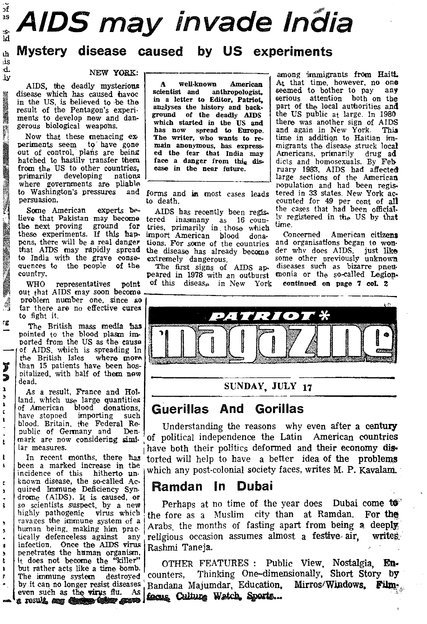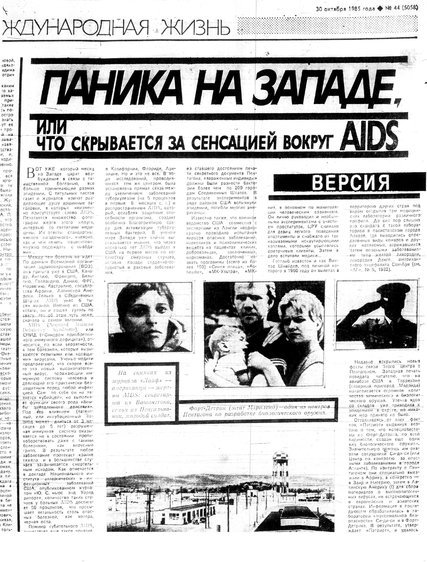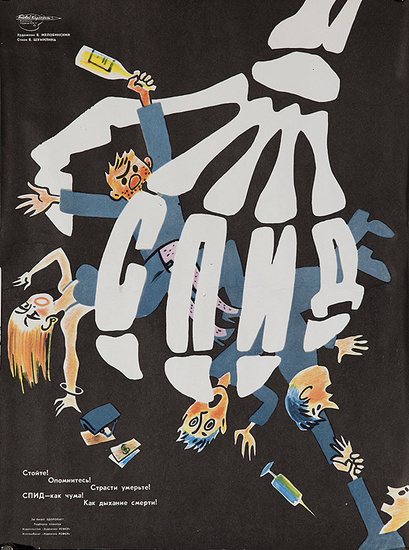
In the early 1980s, the HIV/AIDS virus emerged and spread with quick and deadly force. Throughout the decade and into the 1990s, those infected (often part of socially-ostracized groups) fought for their lives in the face a seemingly indifferent government, a willfully-blind public, and slow-moving pharmaceutical companies. However, in the midst of the chaos caused by this disease, the USSR’s Communist Party and the KGB saw a perfect opportunity to stir up international trouble.
By 1983, President Reagan’s confrontational attitude toward the Soviet Union had once again heightened tensions between the two countries. Furthermore, AIDS was not only deadly and greatly alarming, but its origins were very mysterious. Thus, in 1983, the KGB fabricated a letter supposedly written by “a well-known American scientist.” It stated that AIDS was a result of Pentagon attempts to create biological weapons – purportedly, they had infected prisoners with the disease but were then unable to control its spread. The letter was published on July 17, 1983 in a small, Soviet-funded magazine, Patriot, in India.

This letter did not attract the worldwide attention the KGB hoped for. By 1985, however, HIV/AIDS had spread worldwide and garnered significantly more press coverage. So, on October 30, 1985, an article entitled “Panic in the West, or What’s Behind the Sensation over AIDS” was published in Soviet newspaper Literaturnaya gazeta.

The article cited the letter, referring to the Patriot as a “well-respected Indian newspaper.” Nope, nothing to see here folks, it’s not like we fund that newspaper’s very existence. The tricky thing about both the letter and the article was that most of the information they cited about AIDS and past CIA projects was true and verifiable, which lent credibility to the falsified bits.
Next, the KGB looked for what they referred to as a “useful idiot” – in this case, East German scientist Jakob Segal. Presumably, they showed him fabricated evidence of the U.S. government’s involvement in the creation of the AIDS virus. Segal proved to be a solid choice. He was passionate and articulate in interviews, and wrote a 43 page pamphlet entitled “AIDS – its nature and origin,” which was distributed with great success at a conference of leaders in Harare, Zimbabwe. The theory caught on, not just in the Soviet Union or Africa, but in Western countries as well. Although Gorbachev eventually put a stop to the operation, its legacy remains an issue in HIV/AIDS treatment even today. In one 2006 study, researchers found that 29% of African-Americans, 22% of Hispanic-Americans, 9% of Asians, and 20% of whites in America believed that AIDS was created by the government to kill off minority populations.

Operation Infektion was how the USSR dealt with HIV/AIDS at the international level. But what was happening with the disease domestically? Officials initially held that because HIV/AIDS was linked to promiscuity and “deviant” behaviors, and the Soviet Union had none of those, HIV/AIDS would not be a problem in the USSR. Nonetheless, the first official Soviet death from AIDS occurred in 1988 – a sex worker named Olga. In this 1989 article, the author expresses little sympathy and much judgement for the deceased – a clear sign of the stigma attached to the disease. Even more notable was a letter written and signed by 16 young physicians. It read:
Dear colleagues: We graduates of a medical institute (16 young men) are categorically opposed to combating the new ‘disease’ AIDS! And we intend to do everything in our power to impede the search for ways to combat that noble epidemic. We are convinced that within a short time AIDS will destroy all drug addicts, homosexuals and prostitutes. We are confident that Hippocrates would have approved of our decision. Long live AIDS!
Although this letter appalled many, it was representative of the stigma that prevailed not only in the USSR, but worldwide. Ultimately, while HIV/AIDS in the USSR was not on the scale of the epidemic in America, within a decade HIV would become one of Russia’s biggest public health dilemmas. Undoubtedly, the legacy of Operation Infektion and HIV-related stigma from the early days has had a severe impact on the present situation.
For further reading about the HIV/AIDS epidemic:
- And the Band Played On: Politics, People, and the AIDS Epidemic by Randy Shilts – although this book is subject to controversy in its treatment of the supposed “patient zero,” it’s a well-written work of journalism, and it was written in 1987, as events were still unfolding.
- How to Survive a Plague – A fantastic documentary about the ACT UP movement and its struggle to bring attention to AIDS.
- Borrowed Time by Paul Monette – a memoir about living with AIDS in the early years of the epidemic, very powerful.
Note: I discovered this topic last semester while doing research on Russia’s contemporary HIV epidemic. Although I mentioned Operation Infektion in my paper, I did not explore it very deeply, which this post allowed me to do.
What a fantastic post! You did a great job covering such a variety of topics. We certainly see a trend in this disinformation campaign and similar campaigns run by the Russians today. What research did you do last semester and what did you find most interesting?
LikeLiked by 1 person
Thank you! I was also thinking about the parallels between this disinformation campaign and the ones we hear about today – it seems like Russia is a little more blatant about today than the KGB was back then. Last semester I was researching the HIV/AIDS epidemic in contemporary Russia – it started to get really bad there in the 90s, and the epidemic persists today. A lot of the epidemic in Russia is fueled by drug addiction, and it doesn’t help that they are very close the world’s biggest producer of opium (Afghanistan). The main issue is that there is a really harsh stigma towards those with HIV/AIDS and that the government refuses to acknowledge the epidemic.
LikeLike
I love your recounting of the detective story behind the Soviet Union’s dissemination of the rumors about HIV/AIDs — as if there weren’t enough of them already! You made “all the lies we cannot see” visible — and used a terrific array of sources to document your narrative. I remember being in the Soviet Union when the narrative (and stigma) around AIDS began to change. I was acquainted with a graduate student who was working on the treatment of Kaposi’s sarcoma and remember when she first began to openly discuss it’s connections with AIDS — so, this would be just after the Novikov article you cite. My sense was that many health care workers and researchers had been doing what they could to understand the disease before Gorbachev signaled a shift in the official policy.
Also, your post helps me see the current struggles around manipulating public opinion in a new way. Thanks!
LikeLiked by 1 person
I’m glad you liked it! It must have been interesting to see that transition happen!
LikeLike
I really liked your post! And that we both wrote on the same topic and used similar sources but still analyzed uniquely! I think you offer some great insight to the pure fear that revolved around HIV/AIDS and how that fear manifests in false accounts and suspicions! I also really like the visuals you used!
LikeLiked by 1 person
Thanks! You’re right, understanding the fear is really important. People were just so scared when it first started, and with good reason. I imagine I would be terrified if a disease we knew almost nothing about emerged and was so deadly.
LikeLike
I really enjoyed your post! I never knew about Operation Infektion. It is crazy to see how it played into the already frenzied global environment during the epidemic. Thank you for including further reading I am excited to learn more about this topic!
LikeLiked by 1 person
Thank you!
LikeLike
Get PSC Result 2019
LikeLike